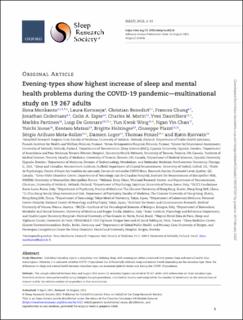| dc.contributor.author | Merikanto, Ilona | |
| dc.contributor.author | Kortesoja, Laura | |
| dc.contributor.author | Benedict, Christian | |
| dc.contributor.author | Chung, Frances | |
| dc.contributor.author | Cedernaes, Jonathan | |
| dc.contributor.author | Espie, Colin A. | |
| dc.contributor.author | Morin, Charles M. | |
| dc.contributor.author | Dauvilliers, Yves | |
| dc.contributor.author | Partinen, Markku | |
| dc.contributor.author | Gennaro, Luigi De | |
| dc.contributor.author | Wing, Yun Kwok | |
| dc.contributor.author | Chan, Ngan Yin | |
| dc.contributor.author | Inoue, Yuichi | |
| dc.contributor.author | Matsui, Kentaro | |
| dc.contributor.author | Holzinger, Brigitte | |
| dc.contributor.author | Plazzi, Giuseppe | |
| dc.contributor.author | Mota-Rolim, Sérgio Arthuro | |
| dc.contributor.author | Leger, Damien | |
| dc.contributor.author | Penzel, Thomas | |
| dc.contributor.author | Bjorvatn, Bjørn | |
| dc.date.accessioned | 2022-03-11T12:52:14Z | |
| dc.date.available | 2022-03-11T12:52:14Z | |
| dc.date.created | 2022-01-21T11:40:51Z | |
| dc.date.issued | 2022 | |
| dc.identifier.issn | 0161-8105 | |
| dc.identifier.uri | https://hdl.handle.net/11250/2984672 | |
| dc.description.abstract | Study Objectives
Individual circadian type is a ubiquitous trait defining sleep, with eveningness often associated with poorer sleep and mental health than morningness. However, it is unknown whether COVID-19 pandemic has differentially affected sleep and mental health depending on the circadian type. Here, the differences in sleep and mental health between circadian types are examined globally before and during the COVID-19 pandemic.
Methods
The sample collected between May and August 2020 across 12 countries/regions consisted of 19 267 adults with information on their circadian type. Statistical analyses were performed by using Complex Sample procedures, stratified by country and weighted by the number of inhabitants in the country/area of interest and by the relative number of responders in that country/area.
Results
Evening-types had poorer mental health, well-being, and quality of life or health than other circadian types during the pandemic. Sleep–wake schedules were delayed especially on working days, and evening-types reported an increase in sleep duration. Sleep problems increased in all circadian types, but especially among evening-types, moderated by financial suffering and confinement. Intermediate-types were less vulnerable to sleep changes, although morningness protected from most sleep problems. These findings were confirmed after adjusting for age, sex, duration of the confinement, or socio-economic status during the pandemic.
Conclusions
These findings indicate an alarming increase in sleep and mental health problems, especially among evening-types as compared to other circadian types during the pandemic. | en_US |
| dc.language.iso | eng | en_US |
| dc.publisher | Oxford University Press | en_US |
| dc.rights | Navngivelse 4.0 Internasjonal | * |
| dc.rights.uri | http://creativecommons.org/licenses/by/4.0/deed.no | * |
| dc.title | Evening-types show highest increase of sleep and mental health problems during the COVID-19 pandemic—multinational study on 19 267 adults | en_US |
| dc.type | Journal article | en_US |
| dc.type | Peer reviewed | en_US |
| dc.description.version | publishedVersion | en_US |
| dc.rights.holder | Copyright Sleep Research Society 2021 | en_US |
| cristin.ispublished | true | |
| cristin.fulltext | original | |
| cristin.qualitycode | 1 | |
| dc.identifier.doi | 10.1093/sleep/zsab216 | |
| dc.identifier.cristin | 1987307 | |
| dc.source.journal | Sleep | en_US |
| dc.source.pagenumber | zsab216 | en_US |
| dc.identifier.citation | Sleep. 2022, 45 (2), zsab216. | en_US |
| dc.source.volume | 45 | en_US |
| dc.source.issue | 2 | en_US |

